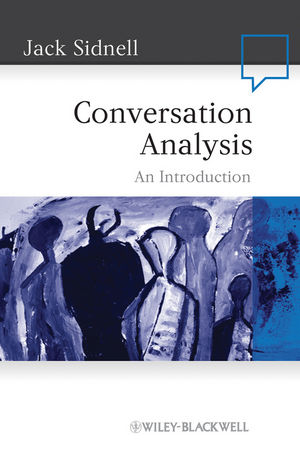Conversation Analysis: An IntroductionISBN: 978-1-4051-5900-5
Hardcover
296 pages
April 2010, Wiley-Blackwell
 This is a Print-on-Demand title. It will be printed specifically to fill your order. Please allow an additional 15-20 days delivery time. The book is not returnable.
Other Available Formats: Paperback
|
||||||
“Overall, I was very favorably impressed by Conversation
Analysis: An Introduction . . . n its own terms, I
particularly liked the straightforward, accessible style that
Sidnell uses to discuss complex ideas and materials.”
(Journal of Sociolinguistics, 1 February 2013)
“To conclude, this introduction is a rich source of authentic examples and will serve interested students and scholars very well.” (Discourse and Communication, 1 November 2012)
"The book is overall an excellent introductory text for the undergraduate level ... On the whole, the book provides a good foundation for a student entering the field, with the main concepts and questions of CA discussed in an informal and engaging way." (Discourse Studies, 2011)"The interdisciplinary research method and field of conversation analysis (CA) is remarkably well-suited to helping teachers achieve this objective, because CA provides tools that enable first the perception, and then the scientific description and analysis of regular patterns of human social conduct - patterns that organize, and make meaningful, the world of everyday life." (Language in Society, 2011)
"This book is an excellent text to introduce students to conversation analysis, situating it historically and with reference to other approaches to human language behavior. Sidnell uses insightful explanations of examples of spoken interactions to present a comprehensive and well-integrated overview of concepts and methods in the field."—Elaine Vine, Victoria University of Wellington
“This is a comprehensive, authoritative yet accessible
introduction to Conversation Analysis. Sidnell captures so well
both the analytic mentality of CA, and the complexity and sheer
contingency of ordinary conversation.”
—Paul Drew, University of York



